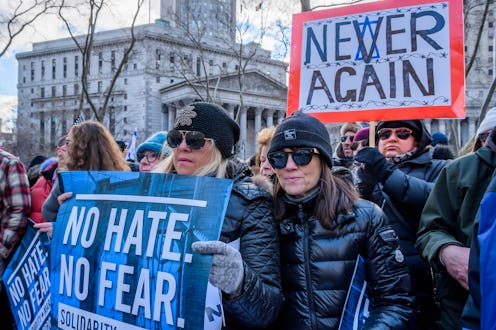How To Help
Here's How To Support Jewish People Amid Rising Antisemitism
Including places to donate and ways to educate yourself.

Nearly 80 years after the end of the Holocaust, antisemitism is once again on the rise. There’s been a spate of disturbing incidents in recent months: In October, Kyrie Irving tweeted a link to a movie containing antisemitic conspiracy theories. In November, the FBI reported they had received credible information about a threat to New Jersey synagogues. In December, Kanye West said in an interview, “I like Hitler,” adding, “I love Jewish people but I also love Nazis.”
Antisemitic rhetoric leads to real danger. In 2020, more than half of hate crimes were committed against Jews. These attacks have created a culture of fear. In 2021, a study of American Jews found that almost 60% had direct experience with antisemitism in the previous year, and about 60% felt less safe than they did five years earlier. That same year, a separate study found that 39% of Jews had recently changed their behavior to avoid being targeted.
For the vast majority of Jewish Americans, this cultural climate is new. Many of us grew up hearing our grandparents’ stories about facing discrimination, living in concentration camps, and losing family members to the Holocaust; we didn’t expect to be confronted with similar issues during our lifetimes. Although today’s bigotry is far less extreme, it’s still deeply concerning.
To combat this rising form of hatred, consider the resources below.
Support Charities That Fight Anti-Semitism
If you can afford to make a donation, these nonprofits aim to fight antisemitism:
ADL: Founded in 1913 to “stop the defamation of the Jewish people,” it now combats bigotry and seeks justice for all.
American Jewish Committee: This international advocacy group fights for Jews’ religious and civil rights.
B’nai B’rith International: In addition to supporting the State of Israel and fighting antisemitism, this group works in disaster relief and affordable housing, and provides care for seniors in need.
Hillel International: With chapters at 550 colleges and universities, this organization supports Jewish life on campus.
The Jewish Agency for Israel: The largest Jewish nonprofit in the world, its mission is to “ensure that every Jewish person feels an unbreakable bond to one another and to Israel no matter where they live in the world.”
The Jewish Federations of North America: This network of 446 communities across the continent aims to better the lives of Jewish people worldwide.
Jews for Racial & Economic Justice: Based in New York City, this organization seeks to create an anti-racist, equitable democracy.
Simon Wiesenthal Center: Named for a Holocaust survivor and Nazi hunter, this research group studies the Holocaust and hate.
Stand With Us: This nonpartisan group supports education about Israel.
Educate Yourself About Jewish History
Museums are a great way to learn about Jewish history and life. In New York City, there are plenty of options: The Jewish Museum, Museum of Jewish Heritage, Center for Jewish History, American Jewish Historical Society, the Museum at Eldridge Street, and the Tenement Museum.
Other museums across the country include the Museum of Tolerance in Los Angeles, the United States Holocaust Memorial Museum in Washington, D.C., the Contemporary Jewish Museum in San Francisco, The Breman Museum in Atlanta, the Museum of the Southern Jewish Experience in New Orleans, the Kaplan Feldman Holocaust Museum in Saint Louis, the Holocaust Center for Humanity in Seattle, the Jewish Museum Milwaukee in Wisconsin, the Oregon Jewish Museum and Center for Holocaust Education in Portland, Oregon, and the Maine Jewish Museum in Portland, Maine.
You can also tour certain sites virtually, including the Anne Frank House in Amsterdam, the concentration camp Auschwitz in Poland, and Holocaust museums around the world.
The more knowledge a person has about the Holocaust, the more likely they are to feel warmly toward Jews. One powerful way to educate yourself is to read or listen to testimony from Holocaust survivors. The United States Holocaust Memorial Museum has a collection of stories online and coordinates in-person visits. The nonprofit 3GNY also arranges speaking events.
Podcast fans should check out Unorthodox, a weekly show about Jewish news featuring a variety of guests.
Enjoy Jewish Culture
There’s so much more to the Jewish experience than just persecution. It’s a rich culture. To get a taste, try one (or more) of the following. Most of these aren’t “about” Judaism, per se, but they show different slices of Jewish life.
TV: My Unorthodox Life, Fleishman is in Trouble, The Shrink Next Door, The Nanny, Seinfeld, Curb Your Enthusiasm, the “Happy Challah Days” episode of Padma Lakshi’s Taste the Nation.
Books: Romance fans will like Rachel Lynn Solomon, Rosie Danan, Jean Meltzer, Elissa Sussman, and Amanda Elliot. For commercial fiction, pick up Jennifer Weiner and Elyssa Friedland. For literary fiction, Melissa Broder and Felicia Berliner. For historical fiction, Lynda Cohen Loigman. For memoir, Bess Kalb. For essays, Dara Horn.
Music: HAIM, Doja Cat, Drake, Troye Sivan, Adam Levine, Billy Joel.
Food: Think beyond just bagels. Try blintzes, borekas, borscht, brisket, challah, chicken soup, deli sandwiches, egg creams, falafel, gravlax, hamantaschen, Israeli salad, kibbeh, kugel, latkes, matzo, matzo brei, pickles, rugelach, shakshuka, sufganiyot, tahdig, and more. Jewish cuisine spans from Eastern Europe to the Middle East; there’s something for everyone.
This article was originally published on